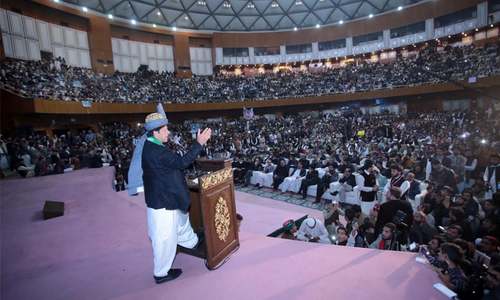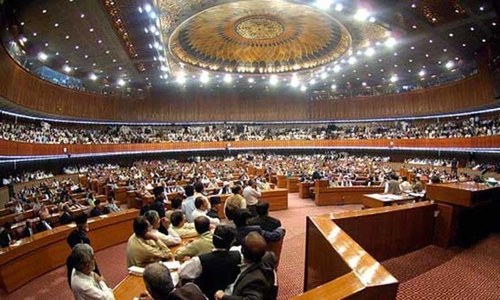ISLAMABAD: The government on Tuesday urged protesting opposition and tribal lawmakers in the National Assembly to not opt for any protest until the prime minister had a chance to explain the challenges facing the Fata reforms.
“Following the backlash triggered by the bill’s withdrawal, Abdul Qadir Baloch, Tariq Fazal Chaudhry and I met the prime minister [on Monday night] and discussed the matter in great detail,” said Sheikh Aftab Ahmed, one of only a handful of government members present in the house.
“Since the PM is flying to Turkey and will return on Thursday night, he has asked me to invite the leaders of all parties to a breakfast meeting at the prime minister’s chambers in the National Assembly, where this issue can be thrashed out,” he told the lower house.
He said that PM Abbasi wanted everyone to wait until Friday and urged them to put off any plans to hold protests until after the meeting.
Earlier, Leader of the Opposition in the National Assembly Syed Khursheed Shah lamented the unorthodox manner in which the Fata reforms bill, which had been agreed upon by nearly all parties, was withdrawn from the agenda of the previous day’s sitting at the eleventh hour.
Minister says Abbasi will meet all party heads on Friday; opposition forms committee to coordinate efforts for reforms’ passage
He said that under the prevailing circumstances, when political fragmentation has become the order of the day, the government “missed the train” in obtaining unanimous approval for the law on the tribal areas.
He said the government was given the opportunity to explain what “technical reasons” led to the bill’s withdrawal, but no response was forthcoming. “The PM’s flight to Istanbul is in the evening, and he could have come to the house today and taken us into confidence if he really wanted to,” the opposition leader regretted.
“Under these circumstances, we consider it an insult to parliament to continue sitting in the house,” he concluded.
Deploring the government’s treatment of Fata, Jamaat-i-Islami’s (JI) Sahibzada Tariqullah warned that the situation might escalate to 1971-level if the matter of Fata was left hanging for much longer.
“Is it not an insult to parliament that one agenda is issued the previous night, but a completely different one is tabled in the morning,” he asked, urging the speaker to take notice of the incident.
“We will continue our boycott and walkout unless a final decision is taken on the matter within the next few days,” said the lawmaker from Dir, whose party head Sirajul Haq held a protest over the delay in the tabling of Fata reforms in the capital on Tuesday, and has already announced plans to lead another demonstration on Sunday.
The call was also endorsed by Pakistan Tehreek-i-Insaf (PTI) MNA Asad Umar, who told Dawn after the session that the opposition had jointly decided to form its own committee on Fata to coordinate efforts within parliament and press the government to continue the reform process.
The decision was taken during a meeting, held in the opposition leader’s chambers on Tuesday afternoon and attended by Awami National Party’s (ANP) Ghulam Ahmed Bilour, Sheikh Rashid Ahmed, Mr Shah and Mr Umar himself.
“The government obviously is not doing it so there has to be some pressure brought on them,” he said, adding that while all parties were pursuing their own action plans outside parliament, the opposition had decided to pool their efforts within the legislature.
He said that following this meeting, Deputy Speaker Murtaza Javed Abbasi also met Fata MNAs at Parliament House in a bid to address their concerns over the delays in the introduction of the bill calling for the extension of the superior judiciary’s jurisdiction to Fata.
Insiders say that at this meeting, the lawmakers were assured that the Fata bill had been finalised and would be laid before parliament upon the PM’s return after “a few technical issues” had been ironed out.
However, Pakhtunkhwa Milli Awami Party leader Mehmood Khan Achakzai is of the view that it is impossible to merge Fata with Pakistan under the current constitutional and legal framework.
In an informal chat with reporters at Parliament House on Tuesday, he said there were two possible ways forward: either Fata should form a confederation with Pakistan, or it should be governed by a popularly elected governor.
But this view is opposed by proponents of the Fata reforms plan, who say that a constitutional amendment or presidential order should suffice in this regard.
Published in Dawn, December 13th, 2017














































Dear visitor, the comments section is undergoing an overhaul and will return soon.